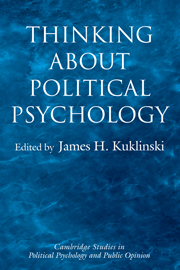Book contents
- Frontmatter
- Contents
- List of Contributors
- Introduction: Political Psychology and the Study of Politics
- Part I Defining Political Psychology
- Part II Theory and Research
- 2 Who Can Persuade Whom? Implications from the Nexus of Psychology and Rational Choice Theory
- 3 Expanding the Envelope: Citizenship, Contextual Methodologies, and Comparative Political Psychology
- 4 The Challenges of Political Psychology: Lessons to Be Learned from Research on Attitude Perception
- Part III The Psychology–Politics Nexus
- Part IV Political Psychology and Aggregate Opinion
- Index
- Books in the series
2 - Who Can Persuade Whom? Implications from the Nexus of Psychology and Rational Choice Theory
Published online by Cambridge University Press: 28 July 2009
- Frontmatter
- Contents
- List of Contributors
- Introduction: Political Psychology and the Study of Politics
- Part I Defining Political Psychology
- Part II Theory and Research
- 2 Who Can Persuade Whom? Implications from the Nexus of Psychology and Rational Choice Theory
- 3 Expanding the Envelope: Citizenship, Contextual Methodologies, and Comparative Political Psychology
- 4 The Challenges of Political Psychology: Lessons to Be Learned from Research on Attitude Perception
- Part III The Psychology–Politics Nexus
- Part IV Political Psychology and Aggregate Opinion
- Index
- Books in the series
Summary
Political psychologists and rational choice theorists do not interact very much. This silence is particularly ironic when it comes to explaining political behavior, as such explanations are a core concern of both groups.
Consider, for example, the topic of persuasion, and in particular how people in political settings choose whom to believe. Voters, legislators, and jurors are but a few of the many political decision makers who have opportunities to base what they do on the written or oral statements of others. To explain the decisions that people who can learn from others make, we should understand what makes some statements more persuasive than others. An irony of extant persuasion research is that while it represents an active field of study for both political psychologists and rational choice theorists, most treatments of the topic cite the contributions of no more than one of the two scholarly traditions. It is as if political psychologists and rational choice theorists have nothing to teach each other about persuasion.
Do intellectual differences between these scholarly traditions negate the possibility of constructive dialogue? As a formal theorist who grapples with political psychology's substantive challenges, I face this question often. I have come to believe that a constructive dialogue is not only possible but also worthwhile.
- Type
- Chapter
- Information
- Thinking about Political Psychology , pp. 51 - 88Publisher: Cambridge University PressPrint publication year: 2002
- 33
- Cited by



